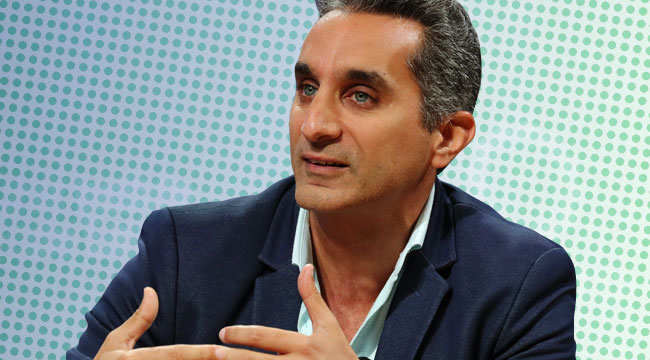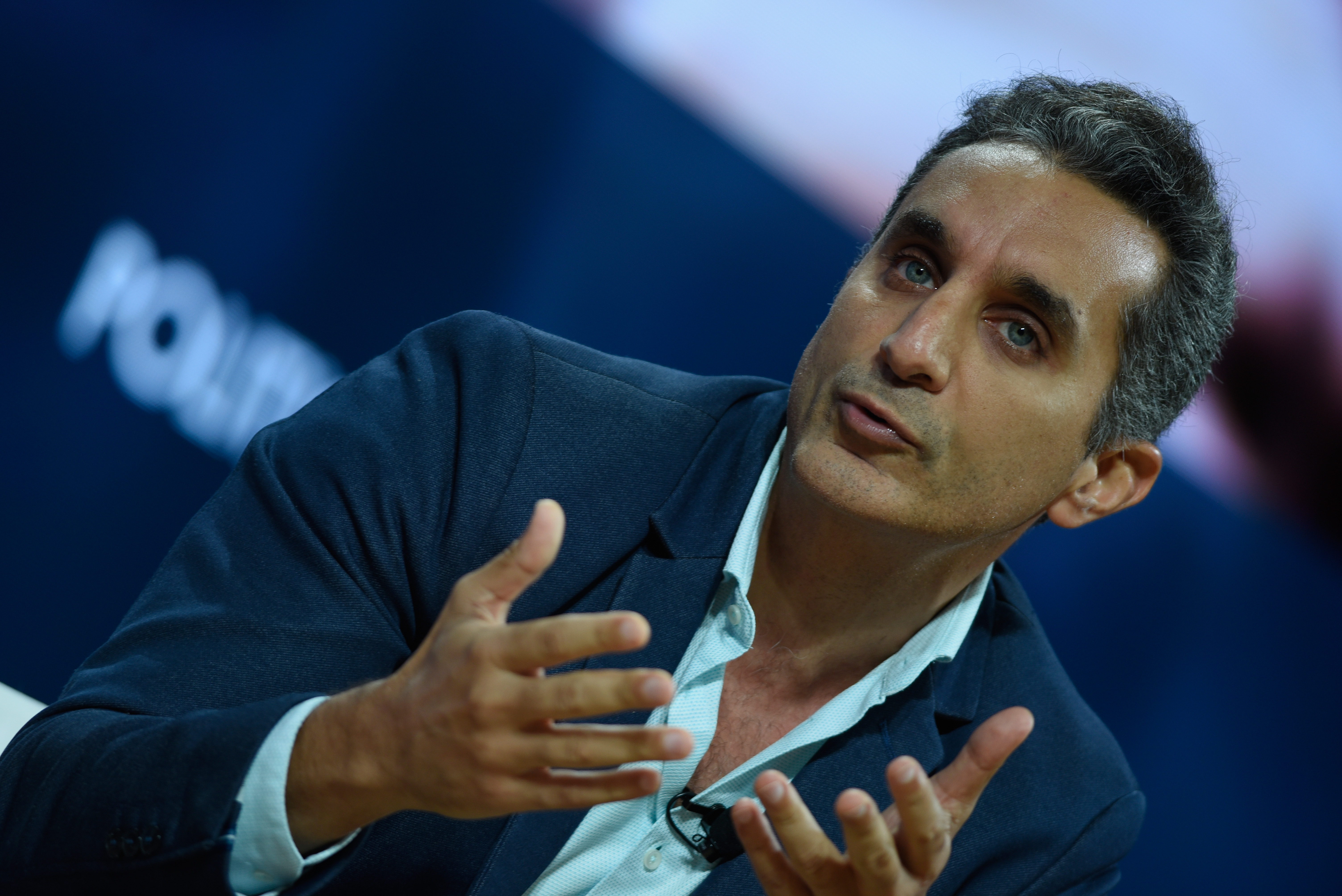
Bassem Youssef knows what it feels like to be a true outsider. A doctor entering the world of comedy in Egypt after the Arab Spring, a satirist who became a global star while also dealing with severe pushback from his government, and now an immigrant in the United States at a time when hostility toward some outsiders is uncomfortably high.
But in speaking with Youssef, as we did recently while discussing his new podcast, ReMade In America (which debuts new episodes on iTunes every Tuesday), you’re given a chance to get dialed in to a fascinating perspective on the outsider’s journey, value, and strength. In the below conversation, we explore that theme, Youssef’s experiences with an America less divided than what we may imagine, the idea of America as a dictatorship, and Donald Trump’s relationship with comedy and criticism.
This is obviously an educational podcast and one with a point of view. This isn’t a time when that’s an easy thing to make work. People are kind of dug in on their opinions. Why was this the project you wanted to do?
The thing is, I think podcasting has been on the rise in the past few years, and it kind of leaves you a much deeper dive to what you want to explore, other than a five minute sound bite in a television interview on a television show. I mean, when you hear these stories, you’re totally immersed in it, and people like to hear human stories because somehow they relate to it.
Most of these stories that I explore are exploring the idea of being an outsider. What does it mean to be an outsider? It doesn’t necessarily have to mean that you’re coming from a different country, you could be an outsider when you are born and raised here. So, I think a podcast is a wonderful tool to use. When you hear podcasts like This American Life, for example, you’re totally immersed in the stories. I know that we don’t have their budget, but at least we’re trying to make an interesting package and an interesting narrative.
What do you think the value is for people that are not outsiders… to hear these different perspectives? Why is that important to you? How do you reach those people?
Well, the thing is, I think everyone is an outsider in one way or another. In the past few years, there have been people who are trying to break from [the] normal narrative. I think there’s a revolution happening every couple of years. People are breaking rules and breaking social norms. I think everybody who has been successful or has done something with his life, he or she has been an outsider in some way or another because there has to be some sort of resistance to him, or her, emerging into society. Whether that is because of the color of skin, because of their sexual orientation, because of their political or religious or non-religious beliefs. I think people who stand out are the people who revolt, who become outsiders to a stagnant society.
A stagnant society does not produce any kind of inspiring, successful stories. Those people who break away from that stagnation are the ones who are successful and the ones who can actually inspire other people. Other people who otherwise might not have the same courage and be inspired to do the same as those stories.
How are you finding your guests? Who are these people?
So, examples of my guests. My first guest was Maz Jobrani, who is an Iranian and a comedian, who immigrated with his family when he was six years old, in the same time as the Iranian Hostage Crisis. And then you have Maria Hinojosa, who was the first Latina NPR anchor. You have Carmen Esposito, a lesbian stand up comedian. Baratunde Thurston, a black comedian and activist who grew up in a very tough neighborhood where he actually saw his Dad being shot because of drug gangsters. All of these people are outsiders in one sense or another. I mean, Baratunde is American, he was born here. Cameron Esposito is American, she was born here. Maria was born in Mexico. Maz was born in Iran. All of these people had to fight against the norms of society. The human being kicked out somehow. They were told many times they couldn’t do it, they can’t do it, they are not going to be able to do it, and yet they fought against it. This is what’s so inspiring about outsider’s stories. They either fight their way in or find their own path and people followed them on the outside.

It was really interesting listening to the episode with Maria where she was talking about how her perspective has changed from when she started in a newsroom to now. I’m curious how your perspective has changed over these last few years as to what America offers and the charms of this country?
Well, I think that we find enough time to criticize America and the political system in America. But I am appreciative to one thing: Americans, in general, they will welcome outsider’s views of them. I mean, I’ve been in live shows where, Americans, white Americans, born here, for generations, and they ask me, the guy who’s been here for a year and a half, “What do you think of American policy?” and “What do you think we can change?” This is something that you won’t find anywhere else. How Americans… and this doesn’t reflect weakness or insecurity, the fact that they accept outsiders to come in and comment and even criticize the system. It’s actually, I think the height of strength, it’s the height of security, not insecurity.
Other countries have the opposite problem, [and] would be extremely defensive about people telling them what they should do. I’m pretty much appreciative of this. I mean, you have some of the leading comedy shows — Trevor Noah, John Oliver, and Samantha Bee, a South African, a British man, and a Canadian, and they are out there, every week, tearing down the establishments, in a satirical way and no one is telling them to go back to their country. Of course, there are people telling them to go back to their country, but the system has embraced it and the audience has embraced it.
I think some people might be surprised to hear that. A lot of people would assume that, just from the examples we’ve seen in the media, there are a lot of people who aren’t willing to accept any kind of criticism for this country. Do we have an over-negative view of this moment? Are we too outraged? Are we too panicked about the state of things?
I think that what makes this country so dynamic politically is that people are used to a certain kind of “service.” If this service is incompetent or insufficient, they will be angry. It’s kind of like, yeah America still is a democracy. With all of the flaws in the American system, it is a democracy. You can still change things through elections. But when you say, do not object to Trump, there are other countries that are much worse. It’s like you are going into restaurants that you paid money for and then the food is inedible and people say you should be thankful because there are other countries in the world who could not find food. No, I paid for this. I paid for this service. I paid for this plate. You cannot treat extremists like there are other people who can’t find food. So, it is the same, you cannot tell Americans that you should be thankful because there are other places in the in the world that have it much worse. No, we worked for it. We worked for it for 400 years. You have the constitution, you fought for it, you should maintain that level of democracy and diplomacy. I think you should ask for better.
Even with Obama, who I think is much better, of course, people have all the right to be outraged and to think he should be better. That is what moves the needle forward and that is what pushes politicians to be the best they can.
Still, the rhetoric out there right now, obviously we saw with Sam Bee. We saw the White House responding to that. We see calls for people’s jobs and obviously, that’s a function of comedy now when someone goes too far with criticism, but it is rare to see that coming from the halls of power and it’s concerning. How does that factor in?
Yeah, well, this is the trait of the dictatorship. The dictator doesn’t allow this. That would be, in my country, the Presidential Palace would not even issue a statement. It would be a phone call and it would stop the show. So, the thing is for the White House to be so triggered over a joke just shows how insecure they are. And this is a problem that I find with Trump. I mean, there are so many things that make you outraged because of Trump, but the one thing that really kind of stayed with me is the fact that he, for two years in a row, didn’t attend the White House Correspondents Dinners. This is a tradition, telling Americans and the whole world, “I am the President. I am the leader of the strongest country in the world and here I am, please make fun of me.” He thinks he is above that and [that’s] because Donald Trump doesn’t understand what it means to be a public servant. He is no servant to anybody. He is old and pampered. This billionaire who is used to firing people, people praising him. He doesn’t take criticism well.
I mean, I have been here for a part of Obama’s presidency and I have seen how Fox News and InfoWars ripped him every single night and you didn’t find the White House issuing a single statement saying that Fox News is unfair. I heard Obama talk a couple times about Fox News, during the White House Correspondents Dinner or saying that facts just don’t matter with them. But they crushed everything with criticism. I can’t even remember George W. Bush’s White House issuing a statement against SNL for ripping him for eight years. Or Jon Stewart ripping him for eight years. So, I mean, I don’t know.
Yeah, it’s traditionally part of the job, not just part of the job but part of our freedom. That’s part of the great part of our freedom that we’re actually able to say these things.
He doesn’t understand that. He gets on his Twitter and he gets into personal feuds with people. Which is even unheard of in underdeveloped countries. It’s just like, that’s something that really just goes over my head.
Is Twitter bad for democracy?
No, nothing is bad for democracy. I mean, listen, Twitter, social media, in general, has its downsides. We shouldn’t spend a lot of time on social media, in general. You shouldn’t, even if it’s bad. I don’t think it’s bad. I think it’s a lot of immaturities and a lot of distraction. It has its benefits, but also has its downside of addiction and wasting a lot of precious time.
Fresh episodes of ReMade In America are available to listen to every Tuesday on iTunes.






